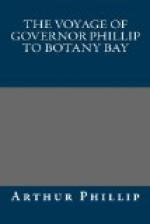Don Lewis de Varconcellos, the reigning Viceroy, belongs to one of the noblest families in Portugal; is brother to the Marquis of Castello Methor, and to the Count of Pombeiro. Governor Phillip, who served for some years as a Captain in the Portuguese navy, and is deservedly much honoured by that nation, was not personally unknown to the Viceroy, though known in a way which, in a less liberal mind, might have produced very different dispositions. There had been some difference between them, on a public account, in this port, when Governor Phillip commanded the Europe: each party had acted merely for the honour of the nation to which he belonged, and the Viceroy, with the true spirit of a man of honour, far from resenting a conduct so similar to his own, seemed now to make it his object to obliterate every recollection of offence. As soon as he was fully informed of the nature of Governor Phillip’s commission, he gave it out in orders to the garrison that the same honours should be paid to that officer as to himself. This distinction the Governor modestly wished to decline, but was not permitted. His officers were all introduced to the Viceroy, and were, as well as himself, received with every possible mark of attention to them, and regard for their country. They were allowed to visit all parts of the city, and even to make excursions as far as five miles into the country, entirely unattended: an indulgence very unusual to strangers, and considering what we read of the jealousy of the Portuguese Government respecting its diamond mines, the more extraordinary.
Provisions were here so cheap, that notwithstanding the allowance of meat was fixed by Governor Phillip at twenty ounces a day, the men were victualled completely, rice, fresh vegetables, and firing included, at three-pence three-farthings a head. Wine was not at this season to be had, except from the retail dealers, less was therefore purchased than would otherwise have been taken. Rum, however, was laid in; and all such seeds and plants procured as were thought likely to flourish on the coast of New South Wales, particularly coffee, indigo, cotton, and the cochineal fig.* As a substitute for bread, if it should become scarce, one hundred sacks of cassada were purchased at a very advantageous price.
[* Cactus Cochinilifer, of Linnaeus.]
Cassada, the bread of thousands in the tropical climates, affords one of those instances in which the ingenuity of man might be said to triumph over the intentions of nature, were it not evidently the design of Providence that we should in all ways exert our invention and sagacity to the utmost, for our own security and support. It is the root of a shrub called Cassada, or Cassava Jatropha, and in its crude state is highly poisonous. By washing, pressure, and evaporation, it is deprived of all its noxious qualities, and being formed into cakes becomes a salubrious and not an unpalatable substitute for bread.




